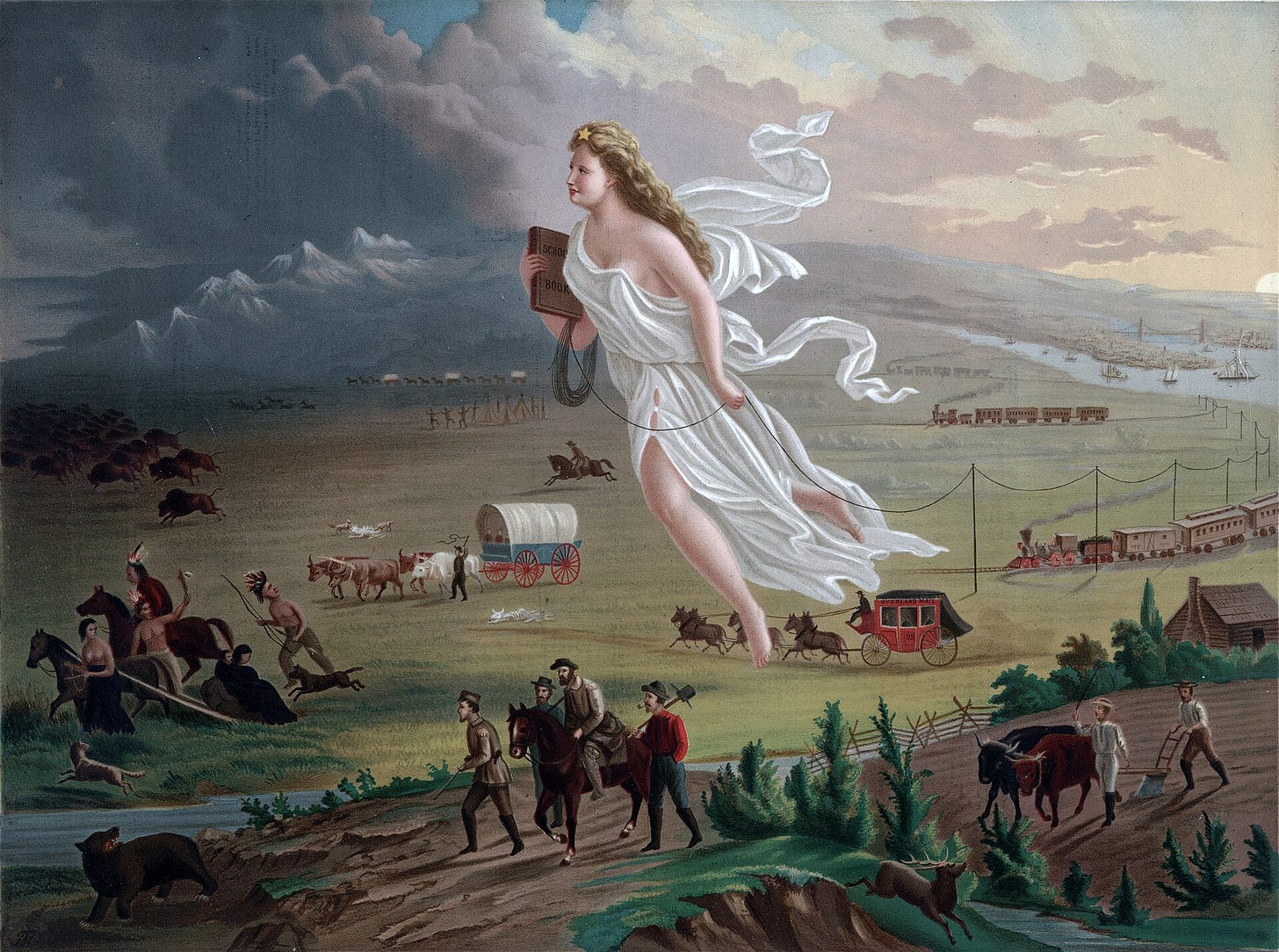Manifest Destiny: A Thought for the New York Times
Just for the Record
Dear Substack Readers, three days of the semester are now in the bag, and they were excellent days, class wise. As always, I loved meeting my new students and introducing them to what I consider to be beautiful ideas and ideals. It didn’t hurt that the weather has been autumnally perfect.
As I’m sure with all of us, though, the shooting in Minnesota affected me deeply and greatly dampened the spirit of the week. Perhaps equally depressing, the left and the right are completely talking past each other after this tragedy, utterly misunderstanding one another. Such is the fate of our polarized times, but I pray (and, yes, I do very much believe in the power of prayer) for healing not only in America but throughout western civilization.
My point in posting today, however, has nothing to do with the events elsewhere.
Last weekend, I was asked by Sam Roberts of the New York Times to comment on the use of a nineteenth-century painting for the advancement of Homeland Security. I’ve been in the Times a couple of times over the years—they very kindly offered a massive and good review of my biography of Russell Kirk back in 2016—and I’m always happy to be seen there.
Here’s the painting:
Here’s the email exchange:
9:46 AM
NEW YORK TIMES query
Dear Professor Birzer, I'm writing an article for The Times about the Dept of Homeland Security's display of Gast's "American Progress" to promote the concept of defending the American homeland. Is that image, and manifest destiny, still something that historians believe is worth promoting or do we need to also include the question of whose homeland it was? Thanks so much, Sam Roberts
Bradley J. Birzer sent the following messages at 10:43 AM
10:43 AM
Dear Sam, thanks so much for reaching out to me. I'm not sure I'm really qualified to answer, as I didn't know about [any of] this until your email, and I'm not sure what the context for Homeland Security using it is. That said, I would say this about Gast, the image, and the concept of Manifest Destiny. Manifest Destiny is a perversion of the frontier spirit. The frontier spirit--at least as envisioned by the Founding through such documents as the Northwest Ordinance--saw free peoples (families, communities, etc.) moving west and farming, slowly integrating with the Native Americans. This would be best expressed in the character of Natty Bumppo, hero of the Leatherstocking Tales. He was neither European nor Indian, but a third thing. Critically, in this vision, settlers would settle on their own, and they would have to work out their own dealings with the Native Americans. Manifest Destiny, as developed in the 1830s and 1840s, was essentially a speeding up of the process through the use of the military. If frontier expansion was the truth, Manifest Destiny was the error and the perversion. MD also is linked, rather seriously, to racist and racialist notions in ways that the Founding never could've conceived. Still, it's worth remembering that all peoples in the world (European, Asian, and even African) gained by the settlement of the West, but all, of course, at the tragic expense of the American Indian. I realize this is an utterly utilitarian and NOT humane calculation, but I offer it anyway. Again, I have no idea what the motivation of Homeland Security is, but I, personally, would be extremely hesitant to tie myself--in any way, shape, or form--to Manifest Destiny. Sam, I hope this helps. Let me offer this, too--this is Article III of the Northwest Ordinance of 1787: "The utmost good faith shall always be observed towards the Indians; their lands and property shall never be taken from them without their consent; and, in their property, rights, and liberty, they shall never be invaded or disturbed, unless in just and lawful wars authorized by Congress; but laws founded in justice and humanity, shall from time to time be made for preventing wrongs being done to them, and for preserving peace and friendship with them." If only! It's a truly beautiful vision, but obviously one that was never realized. Sam, does any of this help? If you follow up with me on this--and please feel free to do so--please use my email address, bbirzer@hillsdale.edu. I very rarely check linked in, and just happened to this morning. Thanks, Sam! Yours, Brad
Here’s what the Times actually printed:
“It’s worth remembering that all peoples in the world (European, Asian, and even African) gained by the settlement of the West,” Professor Bradley J. Birzer, a historian at Hillsdale College, a conservative Christian institution in Michigan, said in an email, “but all, of course, at the tragic expense of the American Indian.”
“Manifest Destiny is a perversion of the frontier spirit,” Professor Birzer said. He specifically cited the Northwest Ordinance of 1787, which laid the groundwork for admitting new states north of the Ohio River and envisioned “free peoples (families, communities, etc.) moving west and farming, slowly integrating with the Native Americans.”
“Manifest Destiny, as developed in the 1830s and 1840s, was essentially a speeding up of the process through the use of the military, Professor Birzer said. “If frontier expansion was the truth," Manifest Destiny was the error and the perversion,” he said. “It also is linked, rather seriously, to racist and racialist notions in ways that the Founding Fathers never could’ve conceived.”
+++
Not exactly what I said, but pretty close. Certainly close enough to be happy with it. I was, however, extremely unhappy that the Times had to identify Hillsdale as a “conservative Christian institution.” It’s not untrue, but no other institution was identified as, say, "Rice University, a left-wing secular institution in Texas.” Sigh. Oh well, such is life. Overall, I’m happy with the article, and I’m happy to be in the Times.




Of possible interest
Why Homeland Security Posted a 19th-Century Painting, Australian University Faces Pushback over AI Art Course, and More: Morning Links for August 29, 2025Source: ARTnews.comhttps://share.google/5c8dpJszgbnjro4kI
Mr. Birzer—-Please explain a bit more what you mean here. I don’t follow.
“If frontier expansion was the truth, Manifest Destiny was the error and the perversion. MD also is linked, rather seriously, to racist and racialist notions in ways that the Founding never could've conceived.”